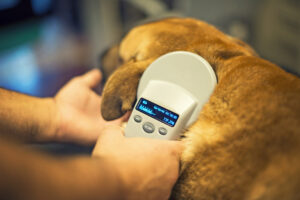By: Dr. Alicia Simoneau, DMV Humane Veterinary Hospital
What is a microchip?
A microchip is a transponder that works using radio waves when activated by a scanner that is waved over the animal. A microchip is about the size of
a grain of rice. It is implanted under the skin, above muscle, in the subcutaneous layer. In dogs and cats the area between the shoulder blades or upper back is the standard area of placement. It is implanted by medical professionals using a sterile hypodermic needle similar to a vaccination. Once implanted the microchip remains active for the rest of the animal’s life. Once a scanner is hovered above the animal with a microchip the unique microchip number appears on the screen of the scanner. Every animal hospital and animal shelter has the ability to scan an anim
al to see if they have a microchip. There are also tags that can be placed on collars to identify that the animal has a microchip. This is helpful if a stray dog or cat is found as it indicates the pet has a home and a family that is eager for a reunion. The finder can even call the microchip company and get in touch with the owner. The unique microchip number needs to be registered with current owner name, address and correct phone number. It is important to ensure a chip is registered and information is up to date. It is a good idea to have the pet scanned by a vet or animal hospital a month or two after implantation to ensure that the chip is still in and hasn’t migrated out of the implantation site.
Why should you have your pet chipped?
Microchips save lives! The majority of animals reunited with owners from shelters are because they are microchipped, registered and with up to date contact information.
You may not think your pet is at risk of becoming a stray. However, accidents happen. Unknowing company can leave a window or door unsecured. A weather event or other accident can damage a house and cause a pet to unforeseeably become a stray. Microchipping is kind of an insurance policy.
Also, you can save money by getting a lifetime license when a dog is microchipped and spayed or neutered.
It is not a GPS tracking device. Millions upon millions of microchips have been implanted worldwide with virtually no adverse reactions. They are very safe.
There are no ongoing fees required. Once a microchip is implanted and registered it is good for the dog or cats life. Typically it costs between $20 and $75 for microchip implantation and registration. However, at Humane Pennsylvania we think microchips are so important that we will microchip and register any cat or dog for FREE! Our Humane Veterinary Hospitals in Reading and Lancaster can scan and implant a microchip at any regular appointment. Alternatively, you can bring a pet to one of our Healthy Pets Initiative Clinics for a free microchip, needed vaccines (Rabies, DA2PP or FVRCP) and deworming, also at no cost to you. To get more information about a clinic, please click here.


